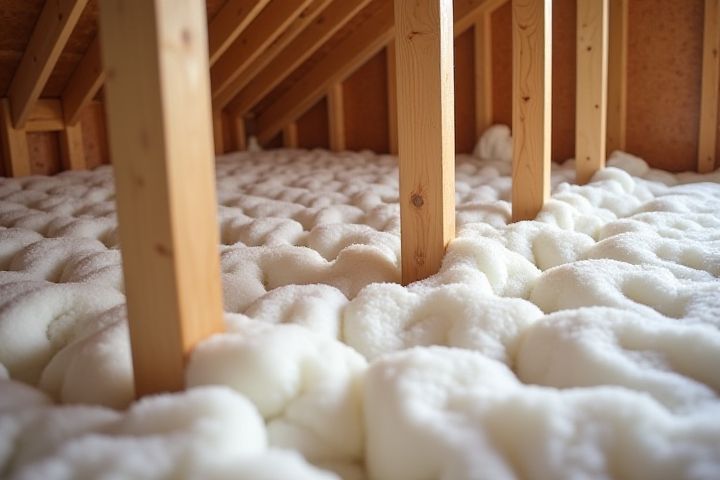
Insulation plays a crucial role in maintaining comfortable indoor temperatures by reducing heat transfer between the inside and outside of a house. By effectively managing temperature fluctuations, insulation contributes to energy efficiency, leading to lower heating and cooling costs. Furthermore, proper insulation minimizes noise transmission, enhancing acoustic comfort within your living spaces. It also helps prevent moisture buildup, reducing the risk of mold growth and contributing to a healthier indoor environment. Investing in quality insulation can significantly increase your home's overall value and lifespan.
Why Does A House Need Insulation
Temperature regulation
Insulation plays a crucial role in temperature regulation within a house, preventing heat loss during the winter months and keeping interiors cool in the summer. For example, well-insulated homes can achieve energy savings of up to 30% on heating and cooling costs. Without proper insulation, a resident may experience indoor temperatures fluctuating drastically, leading to discomfort and increased energy bills. By investing in quality insulation materials, you enhance your home's energy efficiency and create a more stable living environment year-round.
Energy efficiency
A house requires insulation primarily to enhance energy efficiency by reducing heat transfer between indoors and outdoors. Proper insulation can lower heating and cooling costs by up to 30%, resulting in significant savings on your energy bills. In a well-insulated home, energy consumption decreases, contributing to a smaller carbon footprint and promoting environmental sustainability. Insulation also creates a more comfortable living environment by maintaining consistent indoor temperatures throughout the year.
Reduced utility bills
Insulation significantly contributes to reducing utility bills by minimizing heat transfer within a home. With effective insulation, your house retains warmth during winter and stays cool in summer, which reduces the demand for heating and cooling systems. This efficiency leads to lower energy consumption, directly impacting your monthly utility costs. Investing in insulation not only enhances comfort but also provides long-term savings on energy expenses.
Enhanced comfort
Insulation is crucial for maintaining enhanced comfort in your home by regulating indoor temperatures and reducing drafts. Proper insulation minimizes heat exchange, keeping your living spaces warm during winter and cool during summer, thus creating a stable environment. Furthermore, effective insulation dampens external noise, allowing for a quieter, more serene atmosphere. By investing in quality insulation, you can significantly improve your overall comfort while also promoting energy efficiency and reducing utility bills.
Noise reduction
Insulation plays a crucial role in noise reduction within a house by acting as a barrier that dampens sound transmission. When properly installed, materials like fiberglass, cellulose, and foam can effectively absorb or deflect sound waves, minimizing disruptive noises from both external sources and internal activities. This results in a more peaceful living environment, allowing you to enjoy your home without the interruptions of street traffic, neighbors, or noisy appliances. Investing in quality insulation not only enhances acoustic comfort but also contributes to overall energy efficiency, creating a more tranquil space for you and your family.
Moisture control
Proper insulation in a house is crucial for moisture control, preventing condensation that can lead to mold growth and structural damage. Inadequate insulation can allow warm, moist air to meet cold surfaces, resulting in moisture accumulation and potential health hazards. By maintaining a consistent temperature within walls and ceilings, insulation helps to minimize humidity levels, improving indoor air quality. Ensuring your home is well-insulated can save you from costly repairs and health issues related to dampness and poor ventilation.
Environmental impact
Insulating a house significantly reduces energy consumption, leading to lower greenhouse gas emissions and a smaller carbon footprint. For instance, homes without insulation lose about 20% to 30% of their energy through walls, attics, and floors, which translates to higher energy bills and increased reliance on fossil fuels. By achieving optimal insulation, households can save up to 15% on heating and cooling costs, contributing to a more sustainable environment. Moreover, effective insulation enhances indoor air quality, reducing the demand for energy-intensive heating and cooling systems.
Increased property value
Proper insulation significantly boosts your home's energy efficiency, leading to lower utility bills, which can enhance overall affordability. Homes with high-quality insulation typically see an increase in property value, sometimes up to 15% more than poorly insulated counterparts. Energy-efficient homes are attractive to buyers, as they translate into lower heating and cooling costs, often leading to quicker sales in the competitive real estate market. Investing in insulation not only provides immediate comfort but also secures long-term financial benefits when it's time to sell.
Health and safety
Insulation plays a critical role in maintaining indoor air quality by preventing the infiltration of mold and allergens, which can lead to respiratory issues. Properly insulated homes can also protect against extreme temperature fluctuations, reducing the risk of heat-related illnesses in summer and hypothermia in winter. Furthermore, insulation contributes to fire safety by slowing the spread of flames and smoke, giving occupants more time to evacuate during an emergency. Finally, effective insulation minimizes noise pollution, promoting mental well-being and a quieter living environment.
Extended lifespan of HVAC systems
Insulation significantly enhances the efficiency of your HVAC system, which can lead to an extended lifespan of up to 20 years. By maintaining a more stable indoor temperature, insulation reduces the workload on heating and cooling equipment, consequently lowering energy consumption by approximately 30%. This not only minimizes wear and tear on your HVAC units but also decreases the frequency of costly repairs. Investing in quality insulation ensures your home remains comfortable year-round, while also safeguarding your HVAC system's longevity and performance.
